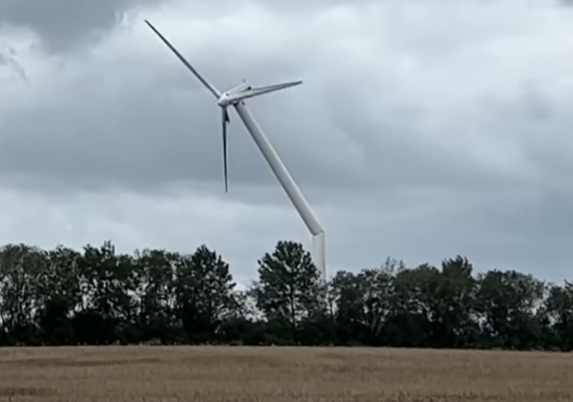A damning special report just released by Germany’s Federal Audit Office on the implementation of the Energiewende (transition to green energy) concludes that the transition is lagging far behind its ambitious targets, both in terms of expanding renewable energies and building the necessary infrastructure.
Symbol image. Collapsing turbine. Image cropped here.
Things aren’t going well for German green energies.
The Bundesrechnungshof (Federal Audit Office, synonymous to the USA’s Congressional Budget Office) also found other serious problems with the country’s revamping of its energy supply.
There is also a considerable risk that security of supply will be jeopardized due to the huge supply gap created by the phase-out of nuclear energy.
Expensive, uncompetitive
Moreover, thirdly, the Federal Audit Office found that electricity prices will continue to rise and that the transition to green energies is a costly undertaking that consumers will have to finance via the feed-in surcharges. Germans not only will have to deal with an unreliable supply, but one that is painfully expensive.
Environmentally harmful
But it gets even worse for the current Socialist-Green government: The environmental compatibility of the transition to green energies is not even guaranteed, according to the report. There is a risk that the expansion of renewable energy power plants will have a negative impact on the environment, e.g. through paving over land, deforestation, destruction of biotopes and the death of birds and bats.
Accelerate the digging deeper into a hole?
The Federal Government must act urgently to get the energy transition on track, the report recommends. The German report contains a number of recommendations that the Federal Government should implement in order to accelerate the energy transition and ensure energy supply security.
The Federal Audit Office’s most important recommendations include:
- The Federal Government must simplify the approval procedures for renewable energy power plants and increase the incentives for an accelerated expansion.
- Expand and modernize the electricity grids to enable the transport of renewable electricity from the windy regions in the north to the consumption centers in the south.
- Develop storage technologies, to compensate for fluctuations in electricity generation from renewable energy power plants.
- Promote energy efficiency in order to reduce electricity consumption.
- Strengthening international cooperation, as it is a global challenge that can only be mastered through international cooperation.
“Nothing to do with reality”
German economics minister Robert Habeck (Greens) was annoyed by the findings and conclusions of the Federal Audit Office. According to ARD German public television, Habeck called the conclusions “Amazing perception that has nothing to do with reality.”
The problem, however, is that most experts believe that it is Robert Habeck who is out of touch.






[…] German Federal Audit Office Warns Germany’s Green Energy Transition Is Way Off Track […]
[…] No Trick Zone […]
The stagnation of the German Energiewende could have been seen coming from miles away. The expansion of the green energy infrastructure in Germany has been kept artificially cheap by subsidies (and backed by unrealistic economic projections and models), but also because Germany relied on countries such as China for the production of much of its solar and wind energy equipment and resources (where mining-products also often poison drinking water). Since the population in these countries is steadily ageing, while also experiencing a continuous loss of economic attractivity and failing to keep-up production speed of this equipment, this form of outsourcing has come at a high price.
As a result, it was inevitable that the Energiewende would not meet its goals.
Additionally, over the past years, a combination of overambitious green goals, fed by the German public media uncritically repeating (and even amplifying) the narrative of climate activist groups, and an effective absence of relevant expertise of the German energy infrastructure, has generated a disordered bureaucratic situation and an energy-grid which is at risk of failing to handle power-peaks and drops caused by extremes in solar and wind energy output.
Currently, there is however a relative increase of ‘green’ energy in Germany, but this may be purely a symptom of the decreasing output of Germany’s heavy industry (which has relied on affordable, stable and safe energy). The total German electric production in 2023 has dropped by more than 10% w.r.t. 2022, fitting in the trend of major industrials relocating their production facilities in other countries with lower energy prices and less prohibitive environmental laws.
Finally, the fact that the German Socialist-Green government has developed a complete blind-spot for the real elephant in the room when it comes to affordable energy, is characterized by a recent article of the Der Spiegel (German magazine which leans towards the SPD/Grüne), in which Germany’s economic stagnation is blamed on a presumed ‘lack of Green ambitions’.
“One of the things the scientific community is pretty agreed on is those things will have virtually no impact on climate no matter what the models say. So the question is do you spend trillions of dollars to have no impact? And that seems like a nobrainer.”– Richard Lindzen, Department of Earth, Atmospheric and Planetary Sciences, MIT; served on UN IPCC